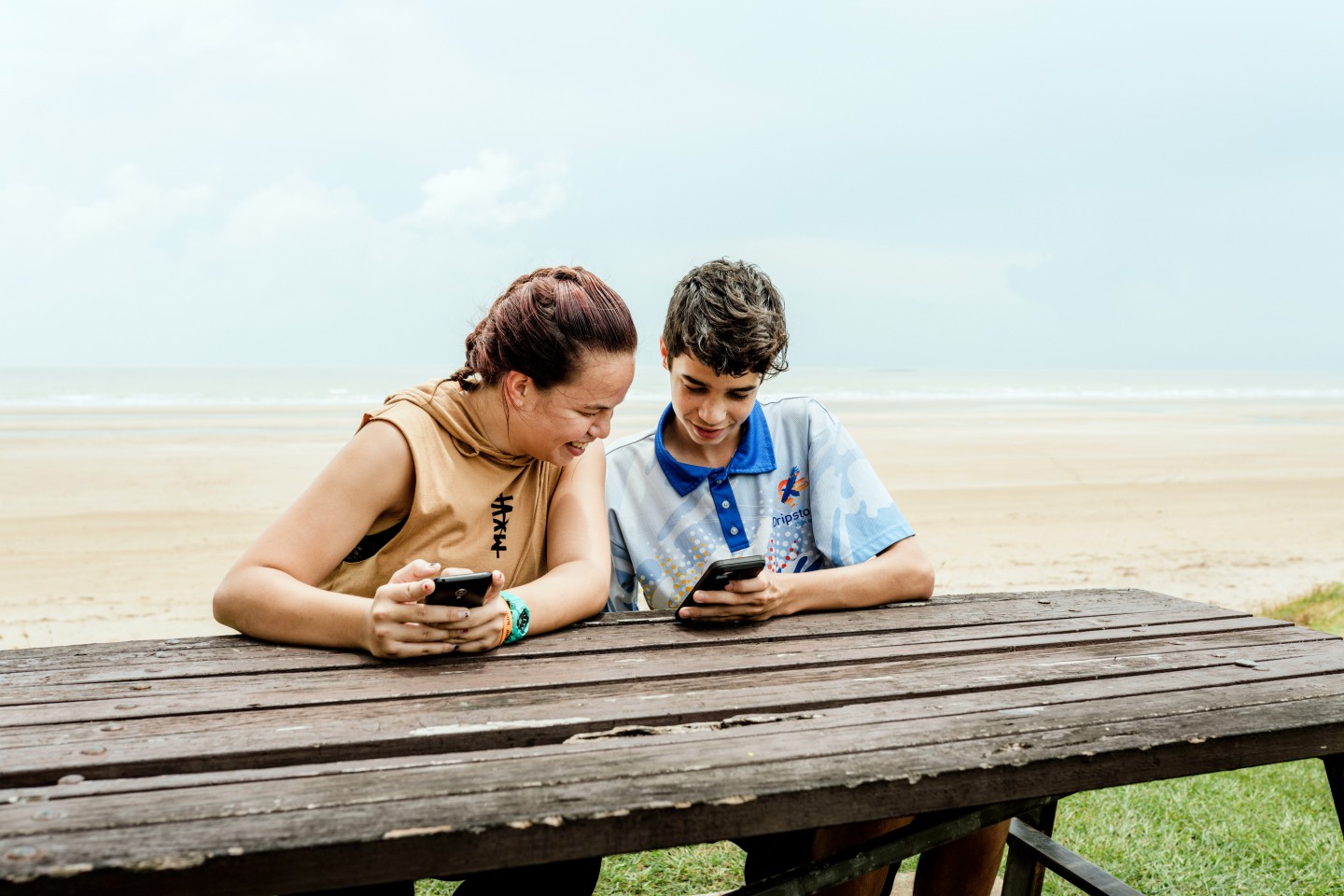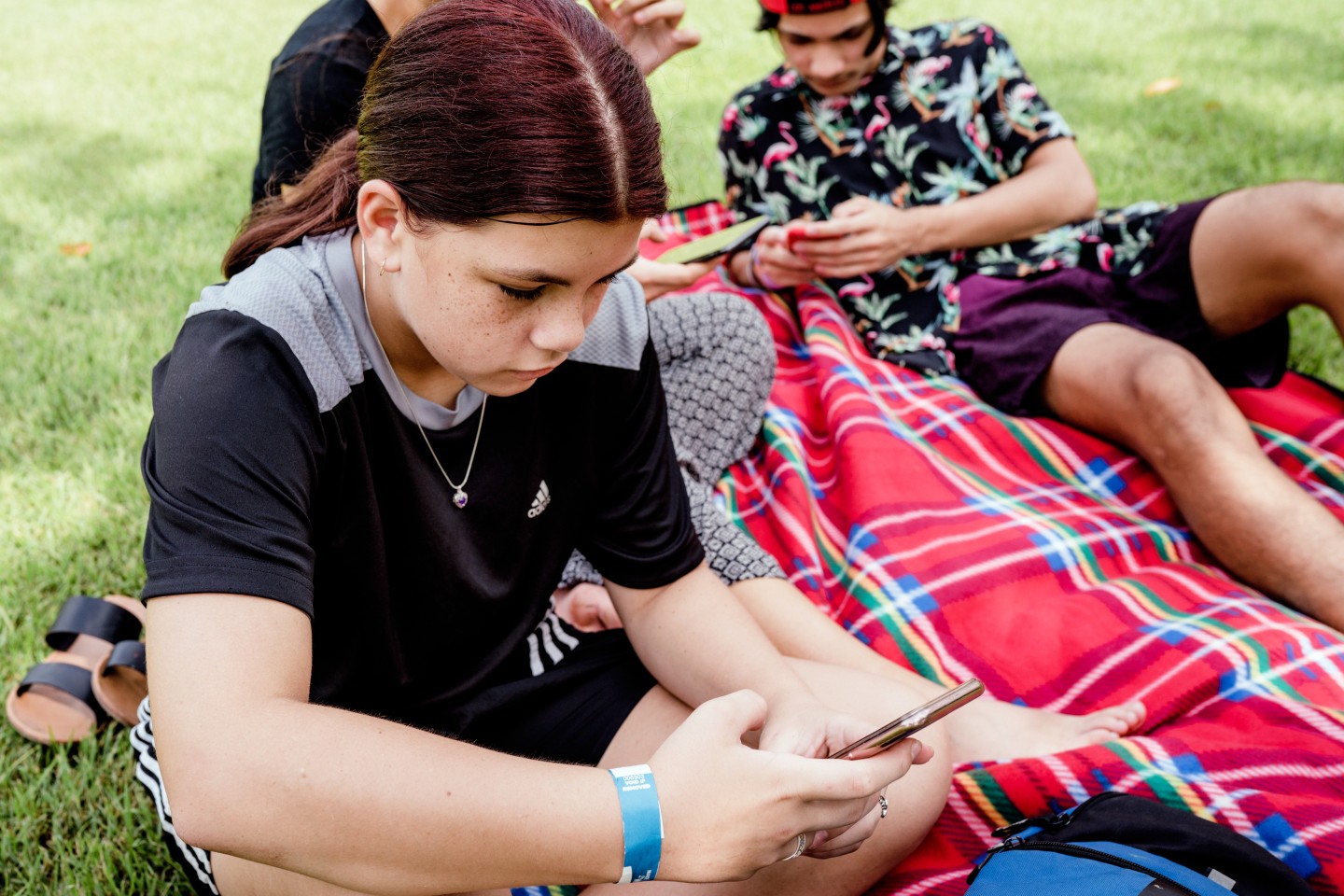Social media is a big part of many young people’s lives and it is used for many different reasons; to connect with friends and family, build community, have fun, relax, explore identity, for self-expression, and staying informed. Social media serves different purposes for different people, so how impacted young people might feel about the restrictions will also vary. We’ve heard young people say they welcome the changes, others say they feel largely unaffected, and some say they feel the changes are confusing, frustrating, isolating, or even distressing.
Family can play an important role in helping young people understand what these changes mean, how they might affect them, and how to stay safe and connected online.
Here are 7 tips for starting a supportive conversation that can invite young people to feel heard, respected, and empowered as they navigate changing digital spaces.
1. Get informed
Take time to read up on the latest rules, debates, and evidence about the social media restrictions so that you can be ready to share what you do know (in age-appropriate ways). If you share a guardian role with another parent or support person, encouraging them to get informed and having conversations about how you understand the changes can help you to take a consistent approach to supporting your family. It might also be helpful to involve older siblings in these conversations.
You can read up on the latest here:
-
The e-Safety Commissioner’s website has the official Social media age restriction pages and FAQs, which are updated regularly
-
headspace has also published resources for family and young people with guides and FAQ’s on the social media ban
2. Start the conversation with curiosity and calm
Start where the young person is at by asking open questions to gauge awareness and understanding about the age restrictions on social media. Pick a moment that’s calm and not rushed like during a walk, a car ride, or over a meal, so the conversation can flow naturally. Once you’ve gauged their understanding, you can share what you know. It’s also okay to admit uncertainty. It’s an uncertain space and this models honesty and helps young people feel safe asking questions and sharing their own thoughts without needing to have all the answers. It also invites ongoing discussion as you navigate it together.
“What have you heard about the social media ban?”
“I know social media is a big part of how you connect and share with friends. Have you spoken with them about under-16s no longer having account access from December? How do you all feel about it?’
“Do you know if the apps you use will be affected by the social media age restrictions?”
3. Talk about the “why” together
The Australian government is implementing social media restrictions because they see this as a necessary step to protect the mental health and wellbeing of children and young people. They believe that the risks of social media, such as cyberbullying, excessive screen time, and exposure to harmful content, outweigh the positives of having accounts.
With the young person, discuss why the government is making the changes, then explore whether those reasons make sense to them. This isn’t about lecturing on the risks but exploring the reasons behind the restrictions together with empathy and curiosity. They may not agree with the reasons for the change or feel that the changes will address the bigger issues and that’s okay. It’s still useful to discuss them together.
“Do you know why the law is changing? I think it’s because of the way social media design features like scrolling, “likes” and notifications encourage everyone to spend more time on screens, and can serve up really upsetting content.”
“The changes are happening to try and make time online safer for young people. What do you think?”
“Some really violent videos get served up on social media. Have you ever felt upset or confused about things you’ve seen? What was it to do with? Researchers say the restrictions will hopefully help prevent that.”
4. Understand their current use and acknowledge what they’ll miss
Ask the young person questions about their current social media use. Knowing what platforms they are on, what they like about them and what they don’t, can help you understand more deeply the impact the social media age restrictions may or may not have for them.
There is a lot of fear-based messaging about the social media restrictions and while it’s tempting to focus on the risks, try and avoid making the conversation all about dangers or control. Lead with interest and a desire to understand. If you use social media, sharing what you use, like, and don’t like, could help you explore together.
“I like using …. to connect with our family friends and get my news. What social media platforms do you and your friends use? How do you like to use them? Are there things you don’t like about them?”
“You use this social media to connect a lot. After the changes, what do you think you might miss out on ?”
“I hear the social media restrictions for under-16s don’t apply to all online spaces – have you talked with your friends about the messaging apps and online games you can still use?”
5. Explore their feelings
Ask how they feel about the changes. Some young people may be feeling fine, but for others, losing or limiting social media access might feel like losing part of their social world and they may feel worried about remaining connected to their friends and online communities. They may also feel a mix of things, like frustration that their online spaces are being taken away but also hopeful about opportunities to focus on other things they enjoy or connecting with friends in different ways. These feelings can also shift and change over time as the ban comes into effect so it’s good to revisit this with them.
“How do you feel about it?”
When young people are unable to identify a feeling, it’s ok to ask a more specific question such as…
“Are you worried about it?” “Do you feel like there are any positives in the changes for you?”
“I know this change might feel unfair – and that’s completely understandable. But there’s been a lot of concern about how social media can affect young people like you and your friends, especially the pressure to keep up. Can we chat about that?”
“I don’t like how social media can make me spend too much time comparing myself with other people and sometimes feel like I’m not good enough. Does it ever upset you like that? Do you think the restrictions could help?”
6. Brainstorm alternatives together
If the young person is open to it, work with them to find other ways to connect, share interests, and keep up with what matters to them. You might have a few ideas or have done some research on what is available in your local area, such as in person social groups or family activities (keeping in mind that the young person may not be interested in them and that’s okay). They may already have ideas or be chatting to friends about alternative ways to connect so invite them to share their thoughts too.
“I know you use … platform to connect with your friends on. Have you and your friends thought about what you might use instead? Are there other activities or interest you would like us to look into together?”
“Let’s work out a way together to stay in touch with your friends or groups you care about like [names], so it feels right for you.”
“Have you and your friends talked about other ways to connect as a group?’ ‘I know you like watching [creator]. We might need to see if we can find them, or someone like them with a similar interest, on another platform or on public feeds that are not age restricted.”
7. Support healthy online habits
The social media restrictions create opportunities for broader conversations about digital safety and building on healthy online habits. Whilst some platforms won’t be accessible for young people under 16, many online spaces will be. Talking about what a balanced digital life looks, including digital safety and resilience, is important.
“I want to understand and support you to be online in ways that feel safe, connected, and balanced, what do you think are ways for you to feel good about how you use social media?”
“Would you like to check together how much time we’re both spending on certain platforms, and maybe set a goal to reduce it bit by bit?”
“What do you think about turning off notifications at certain times, so we’re not tempted to check our phones as much?”
“Even if you’re not using social media accounts there are still pressures and risks. Let’s work out some online safety strategies, like managing your privacy settings.”
If the conversation doesn’t go as planned…
Sometimes even well intended conversations may not always go as planned. The young person may not be open to talking or big feelings might be triggered that can lead to frustration or withdrawing. Wires can get crossed and you might also notice that this topic raises stronger feelings in you than you anticipated. If this happens, it’s okay to pause the conversation to give everyone space if they need it. Reassure the young person that you’re available to talk later and that their feelings are valid. Keeping the lines of communication open over time is more important than having one perfect conversation.
Final thoughts
Family can play a key role in helping young people navigate changes in social media by keeping conversations open, supportive, and non-judgmental. Strong relationships and ongoing connection make it easier for young people to share their feelings, ask questions, and feel understood. While changes might bring challenges, they can also bring opportunities for young people to find new ways to stay connected, express themselves, and enjoy positive online experiences and your support through the process can be really valuable.
How to get support
If a young person you know is having a tough time, get in touch with your local headspace centre or use our online or phone-based service at eheadspace.
For immediate help contact: triple zero (000) if it is an emergency
National 24/7 crisis services:
-
Lifeline: 13 11 14 or lifeline.org.au
-
Suicide Call Back Service: 1300 659 467 or suicidecallbackservice.org.au
-
Beyond Blue: 1300 224 636 or beyondblue.org.au
Additional youth support services include:
-
Kids Helpline: 1800 55 1800 kidshelpline.com.au
-
ReachOut: reachout.com
-
SANE Australia: 1800 187 263 sane.org
The headspace Content Reference Group oversee and approve resources made available on this website.
Last reviewed October 2025.
Get professional support
If you feel you need help there are a range of ways we can support you.


